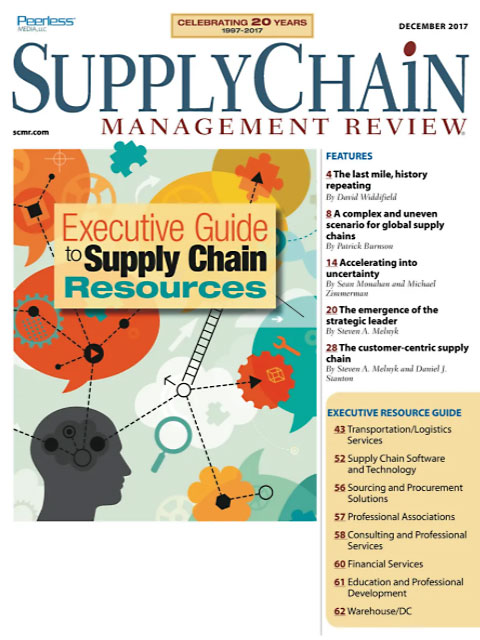Sorry, but your login has failed. Please recheck your login information and resubmit. If your subscription has expired, renew here.
December 2017
It’s December and time once again for our annual Executive Guide to Supply Chain Resources. This is a comprehensive guide to services, products and educational opportunities targeted specifically to supply chain professionals. As with years past, we’re also featuring several articles we trust will offer food for thought in your supply chain throughout the coming year. Browse this issue archive.Need Help? Contact customer service 847-559-7581 More options
Supply chain management is on the cusp of a metamorphosis. For as long as the term has been in use, supply chain practitioners have been tacticians. They focused on making sure that the production lines rolled and orders were filled in the most cost efficient and timely manner. Execution and firefighting were highly valued skills. The profession even had its own language and metrics, apart from those used at the C-level.
Whether those same skills will serve tomorrow’s supply chain manager is very much up in the air. That is especially true as supply chains are transforming from tactical to strategic. In this new model, the key challenge is to harness the supply chain to deliver on a business’ go-to-market strategy by focusing on a broader set of out-comes—outcomes such as responsiveness, innovation and sustainability. Indeed, many supply chain managers are questioning whether they or their organizations will have what it takes to make this change.
In a recent survey of supply chain issues published in CIO Journal, Deloitte noted that the major concern fac¬ing the executives it surveyed was the lack of adequate supply chain talent. Indeed, only 38% of the respondents were confident that their organizations had the required competencies today. They were even less optimistic about the future: Only 44% felt confident that they would have the skills required to meet their needs five years from now. On one hand, this finding emphasizes the fact that there is a supply chain talent crisis—a fact of which most supply chain managers are only too painfully aware. Yet, of more importance than the numbers is the nature of the skills respondents believe will be required of supply chain leaders in the future.

This complete article is available to subscribers only.
Log in now for full access or start your PLUS+ subscription for instant access.
SC
MR
Sorry, but your login has failed. Please recheck your login information and resubmit. If your subscription has expired, renew here.
December 2017
It’s December and time once again for our annual Executive Guide to Supply Chain Resources. This is a comprehensive guide to services, products and educational opportunities targeted specifically to supply chain… Browse this issue archive. Access your online digital edition. Download a PDF file of the December 2017 issue.Supply chain management is on the cusp of a metamorphosis. For as long as the term has been in use, supply chain practitioners have been tacticians. They focused on making sure that the production lines rolled and orders were filled in the most cost efficient and timely manner. Execution and firefighting were highly valued skills. The profession even had its own language and metrics, apart from those used at the C-level.
Whether those same skills will serve tomorrow's supply chain manager is very much up in the air. That is especially true as supply chains are transforming from tactical to strategic. In this new model, the key challenge is to harness the supply chain to deliver on a business' go-to-market strategy by focusing on a broader set of out-comes—outcomes such as responsiveness, innovation and sustainability. Indeed, many supply chain managers are questioning whether they or their organizations will have what it takes to make this change.
In a recent survey of supply chain issues published in CIO Journal, Deloitte noted that the major concern fac¬ing the executives it surveyed was the lack of adequate supply chain talent. Indeed, only 38% of the respondents were confident that their organizations had the required competencies today. They were even less optimistic about the future: Only 44% felt confident that they would have the skills required to meet their needs five years from now. On one hand, this finding emphasizes the fact that there is a supply chain talent crisis—a fact of which most supply chain managers are only too painfully aware. Yet, of more importance than the numbers is the nature of the skills respondents believe will be required of supply chain leaders in the future.
SC
MR


Latest Supply Chain News
Latest Podcast

 Explore
Explore
Business Management News
- AdventHealth named top healthcare supply chain by Gartner
- Unlocking retention: The role employee engagement plays
- Can supply chain managers embrace an entrepreneurial mindset?
- Challenges to ESG reporting
- With capacity to spare, logistics real estate demand remains subdued
- How to improve demand forecasts for new product families
- More Business Management
Latest Business Management Resources

Subscribe

Supply Chain Management Review delivers the best industry content.

Editors’ Picks





